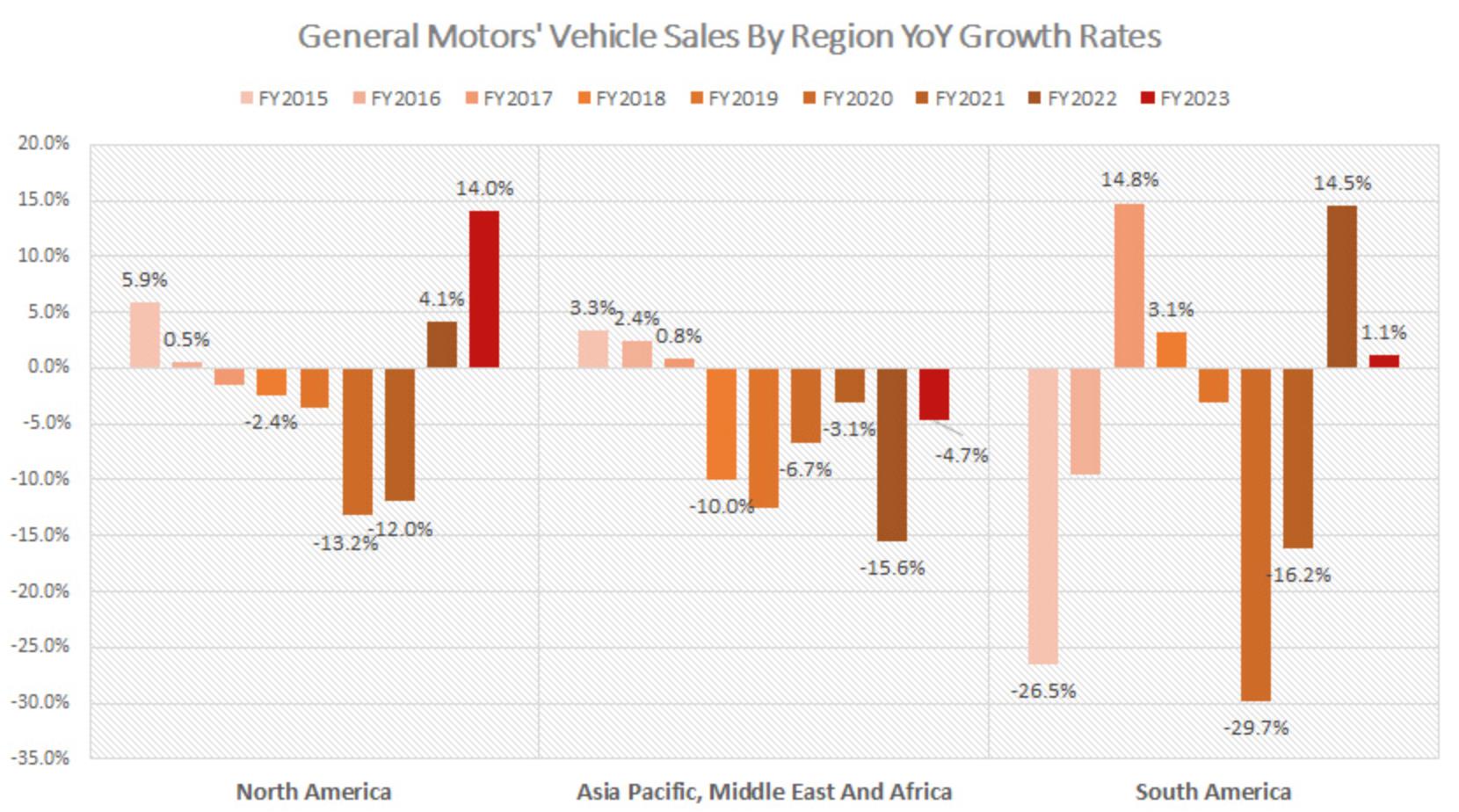Latest stories

Does Netanyahu have a plan beyond his own survival?

The man who shot the Slovak prime minister

Time to establish a European Defense Fund Biden's tariffs will give U.S. car companies like GM and Ford a temporary reprieve from a potential wave of Chinese import competition. But unless Biden - or a future President Trump - put tariffs on EVs made in Mexico as well, the respite will be short-lived, because GM and Ford will still face brand competition from Chinese automakers in their domestic market.
That competition won't just hit GM and Ford's nascent EV business - it'll hit their entire business. ICE cars and EVs are in direct competition with each other. And there are several structural factors that favor EVs over ICE cars in the long run. These include:
Government efforts to accelerate the green transition The fact that battery tech is improving by leaps and bounds while ICE tech is basically stagnant The fact that battery costs are plunging every year due to scaling effects (largely from China) Home charging I wrote a post last year arguing that EVs are destined to displace ICE cars, and that the change will happen quickly.
ICE cars have to fill up often, unlike EVs, which charge overnight in people's garages and so only have to visit charging stations on long trips. So ICE cars require a dense network of gas stations to be viable.
As EVs start to take over the market and ICE cars become rarer, many of our existing gas stations will go out of business. That will make it less convenient to own an ICE car, which will accelerate the shift to EVs. Rinse and repeat.
Gas-powered cars will become a niche product fairly rapidly once this process begins, and EVs will be the cars that most people drive.
Right now, that isn't happening. The market for EVs in the US is still increasing, but not as fast as many had expected, and as a result US automakers are
scaling back their EV plans .
But most Americans - except for a hard core of conservatives who have turned green technology into a culture war - expect to get an EV in the not-too-distant future:

Source: Hannah Ritchie If GM and Ford scale back their offerings, and if Tesla focuses on robotaxis instead of new better EVs, then there's a high likelihood that the EV revolution in America will be carried out by Chinese companies building cars in Mexico.
Tariffs won't stop that, unless A) we levy similar tariffs on Mexico and any other country, and B) Chinese car companies refuse to build factories in the US.
And there's something else that
no
US tariff can stop: American car companies getting outcompeted in export markets.
Ford makes the bulk of its money
from North America , but GM makes
as much or more revenue in Asia , as does
Tesla . U.S. tariffs obviously do not apply to Chinese EVs being sold to Vietnam, or Japan, or Australia, or anywhere else except the US.
So they will do absolutely nothing to help US automakers compete in key foreign markets. Many of those other countries are unlikely to put up giant Biden-style tariffs on Chinese EVs, so GM and Ford and Tesla will be facing BYD and the other Chinese automakers on a more-or-less level playing field overseas (except in China itself, where the government will tip the scales in favor of its own domestic brands).
Chinese competition could thus push American and other car companies out of world markets. That would exacerbate the existing trend:

Source: StockDividendScreener US car companies - like European, Japanese, and Korean car companies - are thus in grave danger, tariffs or no tariffs. The EV transition is happening, and China is the best at EVs. Unless they can raise their game, they are, in the words of Kevin Williams,“cooked.”
Will the tariffs slow down the green transition?
A lot of people are worried that tariffs like these will slow down the transition to a low-carbon future powered by solar power and batteries. For example, David Fickling writes :
He's right to worry. Transportation is responsible for
almost 30% of US carbon emissions , or about 4% of the global total. If the US fails to switch to EVs, it could hamper decarbonization efforts by a small but noticeable amount.
Now, as I said before, if tariffs are only placed on EVs made in China, there's not much to worry about here. Americans will still switch to EVs, they'll just buy their Chinese-brand EVs from factories in Mexico. The green transition will continue apace.
If the US places tariffs on
all
foreign EVs, though, we could be in trouble. A refusal of GM and Ford to bet big on the EV transition (and Tesla's pivot to robotaxis) would then be able to keep America as a gas-guzzling nation, clinging to our outmoded comfort cars, orphaned from global technology and locked out of the high-tech future.
And if Republicans turn EVs into a culture war the way they've done with
lab-grown meat , they could enact restrictive state-level policies that would slow the transition even further.
So I am worried about the green transition in the US, though that worry depends very strongly on whether the US extends its tariffs to Mexican-made EVs.
What does this mean for trade policy going forward?
The most important thing about these tariffs is probably the message they send. Protectionism is now the consensus economic policy of both major political parties in the United States.
Biden has extended the Trump tariffs on China and levied the new EV tariffs; Trump is
trying to one-up Biden
by promising to raise the 100% tariffs to 200%, extend them to Mexico, and slap an additional 60% tariff on all Chinese-made goods.
There is currently no major party or presidential candidate that you can vote for in America that is even remotely interested in free trade. But that still leaves lots of questions. Most importantly, there's the question of what, exactly, protectionism is trying to
protect. I see four main potential purposes of tariffs:
Protecting auto industry jobs and/or corporate profits Reducing trade imbalances with China Eliminating security risks from Chinese hacking Protecting domestic defense manufacturing capacity The first of these is probably foremost in the minds of many progressives, and possibly Trump as well. On the plus side, if Chinese car companies could be persuaded to put their factories in the US like Japanese car companies did, labor-protectionists would be happy.
GM and Ford would still be mad, and they'd probably have some supporters in Congress, but the prospect of a whole bunch of good American manufacturing jobs in BYD or Geely factories would probably win out.
The second of these - reducing trade imbalances - is what everyone talks about.
Articles about the Second China Shock
usually mention things like Chinese underconsumption, overcapacity, and trade imbalances.
The Rhodium Group has a report called“Overcapacity at the Gates” that sums up the viewpoint well. The two most well-known commentators on this issue - or at least, the two I read the most - are
Brad Setser
and
Michael Pettis , so if you want to learn more about this idea, check them out.
It's not clear whether trade imbalances by themselves are a legitimate concern, or whether they're a catch-all proxy for concerns about jobs and other issues. It's also not clear whether tariffs can restore trade balance - it's possible that the expensive dollar is to blame, and that only an abdication of the dollar's role as the global reserve currency can fix things.
More on that in a post coming soon. But for right now, what's clear is that many people are upset about trade imbalances, and tariffs are one available policy for trying to address those imbalances.
The third issue - security risks from Chinese-made goods - is something I'm not really qualified to assess. The fear is that if China's security services put backdoors in Chinese-made products, they could use those built-in vulnerabilities to cause havoc in the US in the event of a war:
Given how a single wayward cargo ship just
took out a major bridge
in Baltimore that will take years to repair, it's pretty terrifying to think about how much destruction China could wreak if it controlled all of our cars.
I will say, though, that it seems like the danger here is entirely from Chinese-made
computer chips. A GM or Ford car made with Chinese computer chips has the same vulnerability as a BYD car made with those same chips.
So if you're worried about cybersecurity, it seems to me that the one and only thing you need to keep out of the US are Chinese-made semiconductors.
Anyway, this brings us to the final concern: defense manufacturing capacity. In times of war, civilian factories are typically repurposed to make war materiel - for example, when Ford
churned out massive quantities
of B-24 bombers during World War 2.
We have a law, called the Defense Production Act, that allows the government to order US companies to switch their production lines to make military equipment or other goods critical to national security (for example, we used the DPA to make companies build ventilators during Covid).
But the DPA is useless if you
don't have the factories
to repurpose. If US heavy manufacturing withers and dies in the face of Chinese competition, the US won't be able to add much to its defense production capacity in a war. That could lead to a swift and devastating US defeat at the hands of China.
My guess is that China knows this very well, and that this is one reason it has been so generous with subsidies and so gung-ho about ramping up manufacturing exports.
Yes, of course they want jobs and growth, but the tantalizing potential of forcibly deindustrializing the West through subsidized exports has undoubtedly crossed the minds of every Chinese leader.
So in order to have domestic manufacturing available for military repurposing, it's probably necessary to erect trade barriers to protect against massively subsidized Chinese import surges.
This consideration has nothing to do with American jobs or profits or trade deficits - it's just a cold, hard military reality. Opponents of protectionism - the Cato Institute, the writers at
The Economist , and so on - seem to have no alternative answer here.
In other words, there are multiple intersecting reasons for tariffs to go up, and most off these have bipartisan appeal. Biden's big tariffs on Chinese EVs are likely only the start of a major shift in America's trade policy.

Sign up for one of our free newsletters The Daily ReportStart your day right with Asia Times' top stories AT Weekly ReportA weekly roundup of Asia Times' most-read stories
This article was first published on Noah Smith's Noahpinion Substack and is republished with kind permission. Read the original and become a Noahopinion subscriber here.
Already have an account?Sign in Sign up here to comment on Asia Times stories OR Thank you for registering!
An account was already registered with this email. Please check your inbox for an authentication link.